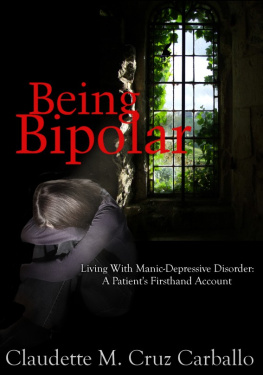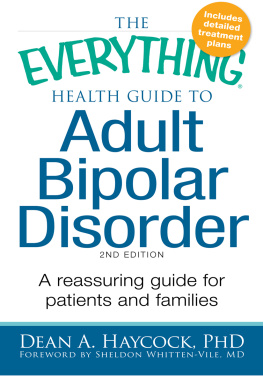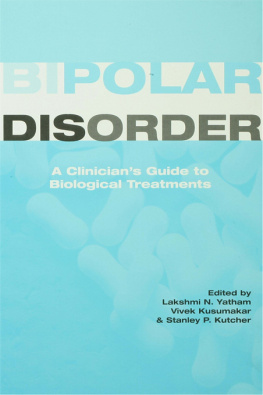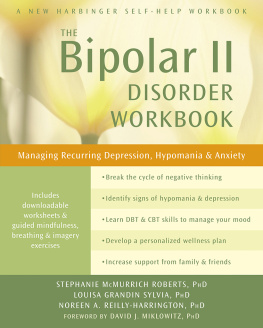Consultant Psychiatrist, George MacKenzie House, Fulbourn Hospital, Cambridge, UK
Bipolar disorder
YOUR QUESTIONS ANSWERED
Neil Hunt
MA MD MRCPsych
Consultant Psychiatrist
George MacKenzie House
Fulbourn Hospital
Cambridge, UK
 EDINBURGH LONDON NEW YORK OXFORD PHILADELPHIA ST LOUIS SYDNEY TORONTO 2005
EDINBURGH LONDON NEW YORK OXFORD PHILADELPHIA ST LOUIS SYDNEY TORONTO 2005
For Elsevier
Commissioning Editor: Fiona Conn
Project Development Manager: Isobel Black
Project Manager: Frances Affleck
Designer Direction: George Ajayi
Illustration Manager: Bruce Hogarth
Illustrator: David Graham
Copyright
ELSEVIER CHURCHILL LIVINGSTONE
Cover image Martin Riedl/Science Photo Library
2005, Elsevier Limited. All rights reserved.
The right of Neil Hunt to be identified as author of this work has been asserted by him in accordance with the Copyright, Designs and Patents Act 1988
), by selecting Customer Support and then Obtaining Permissions.
First published 2005
ISBN 0 4431 0070 5
British Library Cataloguing in Publication Data
A catalogue record for this book is available from the British Library
Library of Congress Cataloging in Publication Data
A catalog record for this book is available from the Library of Congress
Notice
Medical knowledge is constantly changing. Standard safety precautions must be followed, but as new research and clinical experience broaden our knowledge, changes in treatment and drug therapy may become necessary or appropriate. Readers are advised to check the most current product information provided by the manufacturer of each drug to be administered to verify the recommended dose, the method and duration of administration, and contraindications. It is the responsibility of the practitioner, relying on experience and knowledge of the patient, to determine dosages and the best treatment for each individual patient. Neither the Publisher nor the authors assume any liability for any injury and/or damage to persons or property arising from this publication.
The Publisher
Printed in China
Preface
Manic depression (also know as bipolar disorder) affects about 1 in 50 people, but the illness is almost invariably recurrent and often chronic. Every general practitioner will have had experience of making the diagnosis and providing treatment for this group of patients. The nature of the illness is that it is changeable, which makes recognition difficult and distinguishing bipolar disorder from recurrent depression is particularly challenging. Treatment can be complicated because of the way the symptoms vary and some treatments, including antidepressants, can make manic depression more unstable.
This book follows the question and answer format which has proved popular in the other books in this series, enabling the reader to quickly find the information they need. It is a practical guide to the recognition and management of bipolar disorder, from the crises of mania to the chronic care of debilitating depression.
The book is aimed specifically at GPs but may also be of value to other professionals involved in the day-to-day care of bipolar patients psychiatric nurses, psychologists and social care staff. The book was developed in part from articles written for the Manic Depression Fellowship and many questions are aimed specifically at patients and their families, enabling them to understand the nature of the illness and the best approach to managing bipolar disorder in the longer term.
Acknowledgements
I remain indebted to Trevor Silverstone for his help and encouragement over the years which led me to focus my professional life on improving the lot of those who suffer from manic depression.
The inspiration and source of this book have been the many patients who have shared their experiences of bipolar illness in all its manifestations with me. I hope that I have managed to transmit something of their lives in my writing.
Phil Alsop of the Manic Depression Fellowship in Cambridge has been a great help to me and many of the questions come from queries that he and other members of the Fellowship have raised with me in their newsletter.
Margo Stevens has patiently word processed my rather ragged material into a form that could be presented. Philip Augar and Dr Paul Calloway kindly commented on an early draft of the book.
I, like many doctors, am entirely reliant on the forbearance of my wife and also my daughters who all need acknowledgement for their patience and good humour with me.
How to use this book
The Your Questions Answered series aims to meet the information needs of GPs and other primary care professionals who care for patients with chronic conditions. It is designed to help them work with patients and their families, providing effective, evidence-based care and management.
The books are in an accessible question and answer format, with detailed contents lists at the beginning of every chapter and a complete index to help find specific information.
ICONS
Icons are used in the book to identify particular types of information:

highlights information important to clinical practice

highlights side-effect information

highlights case studies which illustrate or help to explain the answers given
PATIENT QUESTIONS
At the end of relevant chapters there are sections of frequently asked patient questions, with easy-to-understand answers aimed at the non-medical reader. These questions are also listed at the end of the book.
What is manic depression (bipolar disorder)?
1.1 What is manic depression?
Manic depression is an illness, which has mood changes as the fundamental aspect. Mood disorders are also called affective disorders by those who prefer more technical terms, affect meaning emotion or feeling.
Every illness is characterised by symptoms that are unique in their pattern and also a degree of disability. In psychiatry there is usually also a time course requirement, so that having symptoms over a very short period would not qualify as the illness.
Manic depression has an onset; it is not a disorder that has always been apparent, although it can become a very persistent problem. It is not a personality type but presents as a change or at the very least an exaggeration of the underlying personality. It has a wide range of symptoms so that vastly different faces of the illness can show over time. This means that you can see extraordinary changes in manic depressives that make the person hardly recognisable between one state and another. The illness reflects but wildly exaggerates mood changes that we all experience. Although in the extremes of manic depression it is clear that patients are unwell, there is a graduation back to normal mood that challenges all of us to define what normal is.
1.2 What is bipolar affective disorder?
).
Manic depression is an unusual illness in that a number of people have a bipolar illness that is currently undiagnosed because so far they have only suffered from depression. Even though the illness might have started with depression in the teenage years it is only when mania appears in the twenties that the diagnosis can be made. The illness affects both genders in essentially the same way.







 EDINBURGH LONDON NEW YORK OXFORD PHILADELPHIA ST LOUIS SYDNEY TORONTO 2005
EDINBURGH LONDON NEW YORK OXFORD PHILADELPHIA ST LOUIS SYDNEY TORONTO 2005